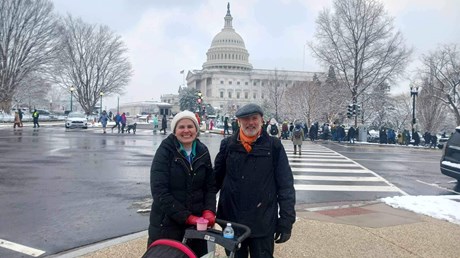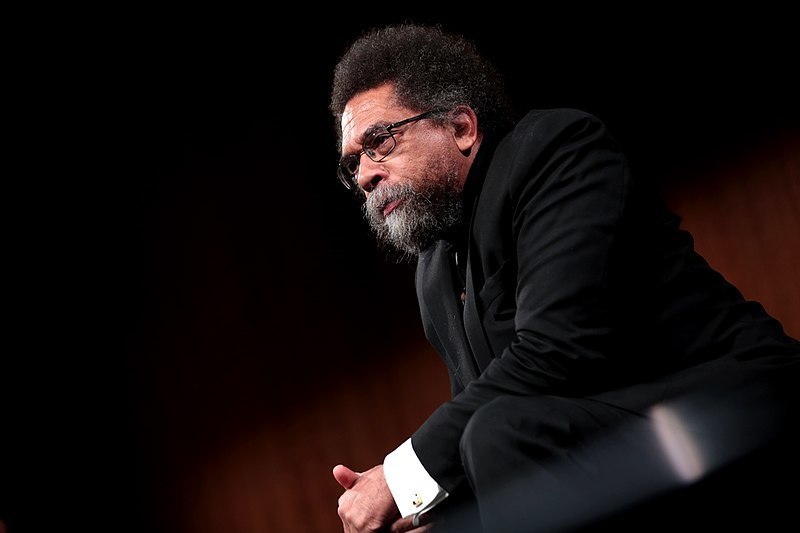Search Results for Independent
Links
Centennial Colorado (CO)
|
Articles
Videos
News
Wearables: Smartphones, fitness trackers, Smartwatches, hearing aids, Apple AirTags, Ring products, etc., all use Bluetooth LE (low energy) to form an independent “mesh network” that...Skynet Has Arrived: Google Follows Apple, Activates Worldwide Bluetooth LE Mesh Network
|
The American Solidarity Party is a small but growing alternative to the Trump-Biden race.
 Charlie Richert would really like to stop voting for his dad.But in the last couple presidential election cycles, the 30-year-old attorney in Indianapolis has been unable to square his conscience with picking either the Republican or Democratic party nominee, so he’s resorted to writing in a name.“There’s no way I can escape having my faith inform how I vote,” said Richert, a nondenominational Christian who grew up Republican. “Unfortunately, we’ve been kind of stuck in a doom loop of candidates at the presidential level that I’ve just not felt comfortable voting for.”This year, he’s not drawn to alternatives like Robert F. Kennedy Jr. or Cornel West. “Maybe I’ll write in Abe Lincoln this year. Sorry to my dad, but a new name to write in would be fun,” he said.He recalls seeking to convince his classmates in an eighth-grade mock election that they should support Mitt Romney, but his chagrin with the Republican Party’s presidential nominee tracked with the ascension of Donald Trump.In a year when both major party presidential candidates are viewed unfavorably by a quarter of Americans, many find themselves less excited about the two options at the top of the ticket. But, like Richert, that doesn’t mean they’re ready to go for third-party options.The third-party candidates running in 2024 span the ideological spectrum, from independents Kennedy and Princeton University professor Cornel West to Green Party candidate Jill Stein. Then there are the more obscure party or candidate options—the Prohibition Party, Andrew Yang’s Forward Party, Maryland politician Jason Palmer, and that man in Texas who changed his name to “Literally ...Continue reading... Charlie Richert would really like to stop voting for his dad.But in the last couple presidential election cycles, the 30-year-old attorney in Indianapolis has been unable to square his conscience with picking either the Republican or Democratic party nominee, so he’s resorted to writing in a name.“There’s no way I can escape having my faith inform how I vote,” said Richert, a nondenominational Christian who grew up Republican. “Unfortunately, we’ve been kind of stuck in a doom loop of candidates at the presidential level that I’ve just not felt comfortable voting for.”This year, he’s not drawn to alternatives like Robert F. Kennedy Jr. or Cornel West. “Maybe I’ll write in Abe Lincoln this year. Sorry to my dad, but a new name to write in would be fun,” he said.He recalls seeking to convince his classmates in an eighth-grade mock election that they should support Mitt Romney, but his chagrin with the Republican Party’s presidential nominee tracked with the ascension of Donald Trump.In a year when both major party presidential candidates are viewed unfavorably by a quarter of Americans, many find themselves less excited about the two options at the top of the ticket. But, like Richert, that doesn’t mean they’re ready to go for third-party options.The third-party candidates running in 2024 span the ideological spectrum, from independents Kennedy and Princeton University professor Cornel West to Green Party candidate Jill Stein. Then there are the more obscure party or candidate options—the Prohibition Party, Andrew Yang’s Forward Party, Maryland politician Jason Palmer, and that man in Texas who changed his name to “Literally ...Continue reading... |
 Independent presidential candidate Cornel West has chosen a founding member of the Black Lives Matter movement as his running mate as he seeks to increase the number of states where he has ballot access. Independent presidential candidate Cornel West has chosen a founding member of the Black Lives Matter movement as his running mate as he seeks to increase the number of states where he has ballot access. |
The American Solidarity Party is a small but growing alternative to the Trump-Biden race.
 Charlie Richert would really like to stop voting for his dad.But in the last couple presidential election cycles, the 30-year-old attorney in Indianapolis has been unable to square his conscience with picking either the Republican or Democratic party nominee, so he’s resorted to writing in a name.“There’s no way I can escape having my faith inform how I vote,” said Richert, a nondenominational Christian who grew up Republican. “Unfortunately, we’ve been kind of stuck in a doom loop of candidates at the presidential level that I’ve just not felt comfortable voting for.”This year, he’s not drawn to alternatives like Robert F. Kennedy Jr. or Cornel West. “Maybe I’ll write in Abe Lincoln this year. Sorry to my dad, but a new name to write in would be fun,” he said.He recalls seeking to convince his classmates in an eighth-grade mock election that they should support Mitt Romney, but his chagrin with the Republican Party’s presidential nominee tracked with the ascension of Donald Trump.In a year when both major party presidential candidates are viewed unfavorably by a quarter of Americans, many find themselves less excited about the two options at the top of the ticket. But, like Richert, that doesn’t mean they’re ready to go for third-party options.The third-party candidates running in 2024 span the ideological spectrum, from independents Kennedy and Princeton University professor Cornel West to Green Party candidate Jill Stein. Then there are the more obscure party or candidate options—the Prohibition Party, Andrew Yang’s Forward Party, Maryland politician Jason Palmer, and that man in Texas who changed his name to “Literally ...Continue reading... Charlie Richert would really like to stop voting for his dad.But in the last couple presidential election cycles, the 30-year-old attorney in Indianapolis has been unable to square his conscience with picking either the Republican or Democratic party nominee, so he’s resorted to writing in a name.“There’s no way I can escape having my faith inform how I vote,” said Richert, a nondenominational Christian who grew up Republican. “Unfortunately, we’ve been kind of stuck in a doom loop of candidates at the presidential level that I’ve just not felt comfortable voting for.”This year, he’s not drawn to alternatives like Robert F. Kennedy Jr. or Cornel West. “Maybe I’ll write in Abe Lincoln this year. Sorry to my dad, but a new name to write in would be fun,” he said.He recalls seeking to convince his classmates in an eighth-grade mock election that they should support Mitt Romney, but his chagrin with the Republican Party’s presidential nominee tracked with the ascension of Donald Trump.In a year when both major party presidential candidates are viewed unfavorably by a quarter of Americans, many find themselves less excited about the two options at the top of the ticket. But, like Richert, that doesn’t mean they’re ready to go for third-party options.The third-party candidates running in 2024 span the ideological spectrum, from independents Kennedy and Princeton University professor Cornel West to Green Party candidate Jill Stein. Then there are the more obscure party or candidate options—the Prohibition Party, Andrew Yang’s Forward Party, Maryland politician Jason Palmer, and that man in Texas who changed his name to “Literally ...Continue reading... |
Evangelical congregations from Texas to Maine plan outreach events in the path of totality.
 The plan in Vallonia, Indiana, involves moon pies.The sun will start to disappear at 1:49 p.m. The wide blue sky that stretches over the cornfields and soybeans along State Route 135 will grow darker and darker, until, after about an hour and 15 minutes, the small farming community of 379 souls will be cast into night.The moon—invisible to the human eye except as an empty space—will overshadow everything. For a minute, and then two, and then three, stars will be visible in the sky. The colors of the world will seem all wrong. And Vallonia will pass through eclipse totality.At Driftwood Christian Church, people will look up at the sky and say, “Wow!” and “Ooo!” and “Look at that!” And they will munch on moon pies decorated with the words of Jesus in John 8:12: “I am the light of the world. Whoever follows me will never walk in darkness.”Pastor Daniel Ison said it was the church’s evangelism committee that came up with the plan. They bought the cookie-and-marshmallow snacks and wrote out the Scripture verse, over and over, hundreds of times.The Independent Christian Church of about 170 doesn’t know how many visitors they’ll get. But they expect a lot of people will drive out to see the eclipse on Monday, April 8. The celestial phenomenon is a rare thing and there won’t be another one in the contiguous US for another 20 years. So the congregation decided to open up the church, its bathrooms, and the field around their building to welcome out-of-town visitors to a celebration of creation.“That God created something like this for us to enjoy—God’s just like, Enjoy my creation, on an epic scale!—I think you just have to ...Continue reading... The plan in Vallonia, Indiana, involves moon pies.The sun will start to disappear at 1:49 p.m. The wide blue sky that stretches over the cornfields and soybeans along State Route 135 will grow darker and darker, until, after about an hour and 15 minutes, the small farming community of 379 souls will be cast into night.The moon—invisible to the human eye except as an empty space—will overshadow everything. For a minute, and then two, and then three, stars will be visible in the sky. The colors of the world will seem all wrong. And Vallonia will pass through eclipse totality.At Driftwood Christian Church, people will look up at the sky and say, “Wow!” and “Ooo!” and “Look at that!” And they will munch on moon pies decorated with the words of Jesus in John 8:12: “I am the light of the world. Whoever follows me will never walk in darkness.”Pastor Daniel Ison said it was the church’s evangelism committee that came up with the plan. They bought the cookie-and-marshmallow snacks and wrote out the Scripture verse, over and over, hundreds of times.The Independent Christian Church of about 170 doesn’t know how many visitors they’ll get. But they expect a lot of people will drive out to see the eclipse on Monday, April 8. The celestial phenomenon is a rare thing and there won’t be another one in the contiguous US for another 20 years. So the congregation decided to open up the church, its bathrooms, and the field around their building to welcome out-of-town visitors to a celebration of creation.“That God created something like this for us to enjoy—God’s just like, Enjoy my creation, on an epic scale!—I think you just have to ...Continue reading... |



 Links
Links  Articles
Articles  Blogs
Blogs  Videos
Videos  News
News  Colors
Colors 

 New links
New links















